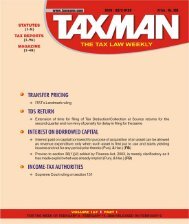CPT V24P7-Art1 (Content).pmd - Taxmann
CPT V24P7-Art1 (Content).pmd - Taxmann
CPT V24P7-Art1 (Content).pmd - Taxmann
Create successful ePaper yourself
Turn your PDF publications into a flip-book with our unique Google optimized e-Paper software.
DIRECT TAX LAWS<br />
638<br />
CBDT needs to issue instructions to<br />
CIT(A) to decide stay of demands<br />
applications expeditiously<br />
The author, in this well researched<br />
article, has raised the issue of stay<br />
of income-tax demands by the CIT(A)<br />
during the course of pendency of appeals<br />
before them. Number of High Courts have<br />
held that the CIT(A) have such powers but<br />
for unknown reasons (or may be on account<br />
of some secret instructions from the<br />
CBDT) no CIT(A) is exercising this power.<br />
Two High Courts have even issued directions<br />
to the CBDT for issuing instructions/<br />
guidelines in this direction, but for some<br />
unknown reasons, the CBDT is shying away<br />
from doing so.<br />
The author, in this article, has examined<br />
the issue of stay of demands during the<br />
pendency of appeals before the CIT(A) from<br />
various angles and has clearly demonstrated<br />
that the CIT(A) have powers to do so. This<br />
exhaustive article on the subject can be of<br />
great assistance for the taxpayers to press<br />
their claims in this regard before the various<br />
IT authorities.<br />
INTRODUCTION<br />
August 1 to 15, 2012 u TAXMANN’S CORPORATE PROFESSIONALS TODAY u Vol. 24 u 18<br />
T.N. PANDEY<br />
Ex-Chairman, CBDT<br />
1. Article 265 of the Constitution of India<br />
mandates that no tax shall be collected except<br />
with the authority of law. Yet, there are umpteen<br />
instances, year after year, where high-pitched<br />
assessments are made with high additions by<br />
the Assessing Officers (AOs), many of which<br />
get knocked down in appeals. But the AOs<br />
start action for collection of demands raised,<br />
in a number of cases even by curtailing the<br />
mandatory period of 30 days allowable for<br />
payment under the Income-tax Act, 1961 (Act)<br />
and even where demands have been secured<br />
by attachment and other legal processes. This<br />
tantamounts to underserved hardship to the<br />
assessee. Coercive action is taken/threatened<br />
for the collection of demand in cases where<br />
the assessments made are, prima facie, on high<br />
incomes unlikely to be sustained in appeals.











![“FORM NO. 3CEB [See rule 10E] Report from an ... - Taxmann](https://img.yumpu.com/45480232/1/190x245/form-no-3ceb-see-rule-10e-report-from-an-taxmann.jpg?quality=85)





